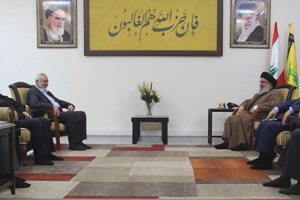
Iran Widens Its “Shadow War” with Israel
By: Daivd Parsons, ICEJ Vice President & Senior Spokesman

During Passover in April, Hamas and Hezbollah launched rocket and terror attacks against Israel from multiple directions, including Gaza, Lebanon, and Syria. While the upsurge in attacks followed old patterns, they also signaled that Iran’s “shadow war” with Israel is slipping into open conflict.
Several factors loomed behind the recent tensions in Israel. First, the convergence of Passover and Ramadan this April made a confrontation almost inevitable. Both holidays have tended to stir religious passions in recent years, as radical Muslims have falsely accused Jews of endangering al-Aqsa as a pretext for Palestinian violence. This well-worn canard has been used for over a century now to incite Arab hostility against Jews and Israel.
Second, Israel looks increasingly vulnerable to its regional enemies due to the divisive national debate over judicial reforms and the West’s dislike for certain ultra-religious elements in Israel’s new government.
Third, a prolonged spate of Palestinian terror attacks has existed for over a year now, claiming 33 Israeli lives in 2022 and 19 so far this year. This prompted the This prompted the Israel Defense Forces (IDF) to launch “Operation Break the Wave” in the West Bank to root out new Palestinian terror cells called “Lion’s Den” that are funded and armed by Iran.
This brings us to the real culprit behind the recent surge in rockets and terror: Iran aims to threaten Israel through proxy militias from multiple directions while avoiding direct confrontation with the IDF.
For over a decade now, Israel and Iran have been engaged in a “shadow war” over Tehran’s renegade nuclear program and its stated goal to wipe Israel from the map. Israel’s military and intelligence agencies have chalked up an impressive number of victories in this covert war, dating back to the Stuxnet computer virus in 2010. The ledger includes successful sabotage attacks on numerous nuclear and missile facilities in Iran, the Mossad’s theft of its nuclear archive from a Tehran warehouse, and the targeting of IRGC commanders and nuclear scientists. With Iran’s intervention in the Syrian civil war, Israel also started launching hundreds of Israeli air strikes across Syria to destroy Iranian forces and weaponry that could threaten Israel.
Iranian leaders are under pressure to even the score but have largely failed in numerous attempts to target Israeli diplomats, businessmen, and tourists in foreign lands. Yet they have made substantial progress in their long-term strategy to encircle Israel with a ring of loyal proxy militias heavily armed with rockets and drones. Iran’s tentacles can now be found in Hamas and Islamic Jihad in Gaza, Hezbollah and Hamas in Lebanon, Iranian-led forces in Syria, various Islamist militias in Iraq, and the Houthi rebels in Yemen.
However, this Passover marked the first time Iran’s subsidiaries launched rockets at Israel from Gaza, Lebanon, and Syria over successive days, demonstrating that Israelis could soon face a dreaded multi-front rocket war. This coordinated message was intentional, given that Hamas leaders met with Hezbollah chief Hassan Nasrallah in Beirut the day before Hamas fired 34 rockets at Northern Israel from Tyre. The Palestinian refugee camps in south Lebanon were always considered Fatah-land, but now Hezbollah has permitted Hamas to recruit and arm these Palestinians to threaten Israel from the north while allowing Nasrallah to deny responsibility for their actions.
Iran also has launched a surprise diplomatic offensive to repair relations with Saudi Arabia and the Gulf Arab states, which threatens to derail the Abraham Accords right when Israel was seeking a historic breakthrough with the Saudis. The radical Shi’ite regime looked on as Israel was building a regional coalition against Iran, but now Tehran appears to have beaten Jerusalem to Riyadh.
With America preoccupied with Russia’s invasion of Ukraine and its global rivalry with China, Iran senses it can now isolate Israel in the region—and they tested the waters with the brazen multi-front assault at Passover.
Iran’s escalation of the conflict also stirred waves of anti-Israel incitement worldwide, especially on the web, further isolating Israel internationally. Chillingly, chants of “Death to Jews” were heard echoing off Brandenburg Gate in Berlin.
Until now, Iran was losing its shadow war with Israel. But the ayatollahs are now thinking they may fare better with open warfare.


